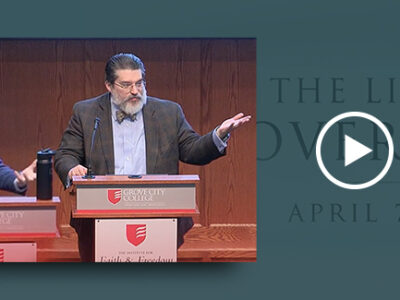EDITOR’S NOTE: The Center for Vision & Values presented a seminar in April, 2010, on the development and influence of Progressivism, focusing especially on the Radical Progressivism of Obama and his friends. The root of the term progressive is, of course, progress. While numerous papers in the conference assumed, or made passing comment on this term, Professor Pearce examined it in detail with special emphasis on what the distinguished British man of letter G. K. Chesterton had to say about it as it unfolded early in the 20th century. Since the term is so basic to the heart of the current political movement, it seemed useful to edit Professor Pearce’s piece into a White Paper. We turn now to comment on a few highlights in the paper.
One important point to note is that believers in progress seldom state exactly where their programs will lead. In other words, they seem never to have an end-game vision. This leaves them with a continuous and endless process of change. Professor Pearce makes this point with the help of Chesterton. A second important point is that the new social/political view called progressivism seeks to replace traditional notions of moral progress—obeying God’s law—with their belief that material and structural development constitutes virtue. A final point to observe in the paper is that the fundamentals of reality simply exist; they do not change as the progressives assume. The Hebrew writer had this in mind when he said, “There is nothing new under the Sun.”
Pearce’s paper is a sophisticated exercise. It will reward the reader, however, with a deeper understanding of the idea of progress and of the misguided thinking of modern progressives.
– L. John Van Til, Ph.D. Fellow for Law and Humanities
The great British writer G.K Chesterton (1874-1936) insisted that progress is not merely a problem but is “the mother of problems.” It is, therefore, necessary to understand what progress is, and perhaps more important what it is not, before we can fully understand and solve the multitude of problems to which it has given birth.
One of the main reasons that progress is the mother of problems is that it is no longer a means to an end but has become an end in itself, especially in the minds of contemporary radical progressives like Barack Obama and his principal idea man, John Podesta. Progress is a law unto itself, and to question progress is not only to question the good that progress is presumed to be, but to question the god that progress has become. According to this dogmatic progressivism, any attack on progress is not only wrong but futile. Progress is unstoppable; it is omnipotent, omnipresent and omniscient, though just what its final goal consists of is seldom stated by its proponents. They only continuously propose myriad government programs which are presumed to bring the good life to all. Further, progress has all the attributes of the divine. It is inexorable, indestructible, and of course, benign. It is not only an all-powerful god, but a good god.
Download the full document here (PDF)


